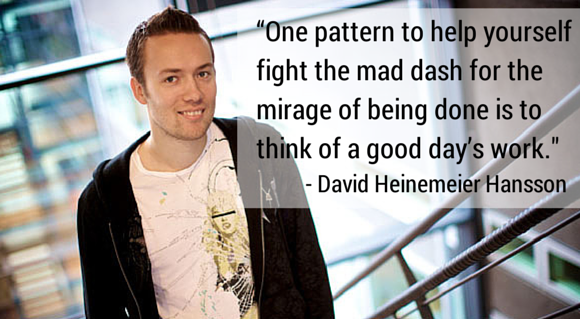For the most productive people, the work is never done. The problem is that when there’s always more work to do, how can you possibly end your day and go home without feeling stressed out and guilty?
You might think that this is just a personal problem, but it turns out that this is a struggle that even the most successful entrepreneurs have had to grapple with.
Here is the system that three highly effective and seasoned tech executives use to manage their own psychology. It’s not sexy, but it’s incredibly powerful, and it’s a simple process you can start today — tracking and reflecting on your day’s accomplishments.
“One pattern to help yourself fight the mad dash for the mirage of being done is to think of a good day’s work. Look at the progress of the day towards the end and ask yourself: ‘Have I done a good day’s work?'”
—David Heinemeier Hansson, 37signals
Taking time for daily reflection on the question “Have I done a good day’s work” is “liberating” because if the answer is yes, “you can leave your desk feeling like you accomplished something important, if not entirely ‘done.'”
If the answer is no, you’re empowered to delve more deeply into why that happened and how you can fix it.
For the people who think they’re too busy to take time out for what sounds like just another task, here’s the twist — “it feels good to be productive,” and feeling productive requires that you take time out to recognize your accomplishments.
When you do, you’ll get on a roll and you’ll want to keep the momentum going. “And if you can keep the roll, everything else will probably take care of itself.”
“You know those days when you’re running around all day and doing stuff and talking to people and making calls and responding to emails and filling out paperwork and you get home and you’re completely exhausted and you say to yourself, ‘What the hell did I actually get done today?”
Your Anti-Todo list has the answer.
—Marc Andreessen, Andreessen Horowitz
Andreessen values the importance of tracking his accomplishments and daily reflection to the extent that he created a system around it, called his Anti-Todo List, or done list.
What you do is this: every time you do something — anything — useful during the day, write it down in your Anti-Todo List on the card.
Each time you do something, you get to write it down and you get that little rush of endorphins that the mouse gets every time he presses the button in his cage and gets a food pellet.
And then at the end of the day, … take a look at today’s card and its Anti-Todo list and marvel at all the things you actually got done that day.
It turns out that “being able to put more notches on my accomplishment belt, so to speak, by writing down things on my Anti-Todo list as I accomplish them throughout the day makes me feel marvelously productive and efficient[,] [f]ar more so than if I just did those things and didn’t write them down.”
Rather than waiting for a major milestone to celebrate an achievement, Andreessen’s process empowers him to take joy in the tiny, wonderful triumphs happen every single day.
That turns into a daily process of rejuvenation and inspiration after a hard-day’s work, and for Andreessen, it’s the positive emotional balance necessary to accomplishing great things.
“Getting up every morning and looking into the mirror, asking myself: ‘Do I like what I am doing?’ After every full day, I do the same in the evening. While I write my next day’s to-do list, I reflect on my achievements. And by doing this, I also try to listen as good as I can how much fun and fulfillment I have gotten. If there are too many days in a row that I can’t answer with a loud ‘Yes’, something is up – I am not happy. And I aim to change things around sharply. Very sharply sometimes.”
When we’re harried and frazzled from everything there’s left to do, it’s easy to forget the picture — that your work should be meaningful and fulfilling. Day after day of non-meaningful work is the surest path to burnout, and that’s why Jobs made daily reflection on his achievements and his happiness such a priority.
Your long-term impact and happiness over the course of an entire career seems like such a distant concern, but to Jobs it wasn’t. His happiness with his work was an immediate, pressing and daily concern and that’s what drove him to only work on projects that he was passionate about. And ultimately, that’s what brought out his best work.
We can’t all be Steve Jobs, but you can follow his example in taking daily stock of your accomplishments and progress, to see not just whether you’re on track but on the track you want to be on.
P.S. If you liked this article, you should subscribe to our newsletter. We’ll email you a daily blog post with actionable and unconventional advice on how to work better.



